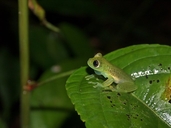|
Description
Espadarana andina has the following combination of characters: 1) vomerine dentition present, 2) bones green in life, 3) dorsal color in life is pale green with old blue spots, 4) snout is sub-ovoid when viewed dorsally and truncated when viewed laterally, 5) dorsal skin smooth and finely granular, 6) ulnar and tarsal tubercles and folds absent, 7) humeral spine in males present, small, thin, curved laterally at 20º, 8) tympanum small.
Adults attain a small size; females reach 24.7-29.5mm SVL, males reach 21.6-26.4mm SVL. Head slightly wider than body and wider than it is long; head width is 34.0-39.9% SVL; distance from nostril to anterior portion of the eye is 48.3-70.4% diameter of eye; diameter of the eye is 35.4-43.8% head length; supratympanic fold is thin but prominent; length of tibia is 52.1-57.9% SVL; when hind limbs anteriorly adpressed the ankle reaches the most anterior part of the snout.
Distribution and Habitat
Country distribution from AmphibiaWeb's database: Colombia, Venezuela
It is known from the west side of Venezuela at elevations between 840 and 1768m, as well as the western side of the Cordillera Oriental of Colombia at elevations between 1630 and 2200m.
Life History, Abundance, Activity, and Special Behaviors
There is a geographic gradient in the dorsal pattern of this species; the most northern populations are less intensely spotted relative to the southern populations. This species has been found calling Jan.-Mar., May-Jun., and Sept.-Dec.
Possible reasons for amphibian decline General habitat alteration and loss
Comments
References
Rivero, J.A. (1985). ''Nuevos centrolenidos de Colombia y Venezuela.'' Brenesia, (23), 335-373.
Rivero, J.A. (1968). ''Los centrolenidos de Venezuela (Amphibia, Salienta).'' Memoria de la Sociedad de Ciencias Naturales La Salle, (28), 301-334.
Ruiz-Carranza, P.M. and Lynch, J.D. (1995). ''Ranas Centrolenidae de Colombia VII: Redescripcion de Centrolene andinum (Rivero 1968).'' Lozania, (64), 1-12.
Originally submitted by: Raul E. Diaz (first posted 2002-12-22)
Edited by: Keith Lui (2009-06-24)Species Account Citation: AmphibiaWeb 2009 Espadarana andina: Andes Giant Glass Frog <https://amphibiaweb.org/species/1731> University of California, Berkeley, CA, USA. Accessed Jun 1, 2025.
Feedback or comments about this page.
Citation: AmphibiaWeb. 2025. <https://amphibiaweb.org> University of California, Berkeley, CA, USA. Accessed 1 Jun 2025.
AmphibiaWeb's policy on data use.
|
